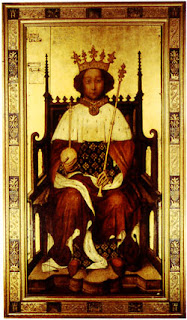This project has been percolating for some time. Back in January, I was already thinking ahead to a possible dissertation project. I used my Medieval Romance class in the spring semester to think about the nature of kingship, which was often periphery but nevertheless important in the various romances we read. My final paper in that class considered how the nature of kingship is closely tied to genealogy and kinship and is set in tension against foreignness or otherness. Here's my introduction to that paper (which I quite like!):
In the Alliterative Morte Arthure, the anonymous poet offers an incredibly complex presentation of King Arthur. There is tension in the poem surrounding the figure of the king in terms of kinship, most especially evident in Arthur’s relationships with Mordred and Gawain, but also in his genealogy and claims to rule in Britain and in Rome. In addition to the poem’s attention to close familial relationships, it is also troubled by an element of foreignness, or otherness. We see these troubling elements in Mordred’s foreign allies and mercenaries, as well as in the giant of Genoa whom Arthur battles on St. Michael’s Mount. I would like to suggest that Mordred and the giant are set up as particular foils of Arthur, representative of foreign elements, as Others in the text. Mordred is nephew to the king, and there are also clear parallels between the giant and Arthur in the text. In light of the parallels between these othered figures and Arthur, I would like to argue that the figure of Arthur in this poem embodies a tension between kingship and otherness. We see Arthur as a king who is simultaneously an individual body, with kinship ties, and a more expansive figure whose individual bloodline has greater importance as the bloodline of a nation. If the king’s bloodline or kinship is corrupted, or indeed if the king himself is Other, there is a present danger for the identity of the nation. First, I will establish the prevalence of textual concern with royal lineage and genealogy in the poem, moving forward to consider Arthur’s close blood ties with living kinsmen. I will then move to establish that, against this reading of kinship, there is tension regarding otherness and foreignness, even in the royal personage of the king himself. Arthur’s self-destruction and active reconstruction of an Other identity is significant in our reading of this text, as the figure of Arthur therefore challenges established notions of kingship and sovereignty.
This was a pretty interesting paper in its own right. Part of its purpose was to whet my appetite for considering kingship -- would I find myself uninterested? Or (as I hoped and suspected) would I simply become ravenous for more? My Amazon wish list confirms this suspicion.
So now, I go forth into considering the Big 8 histories by Shakespeare and just what is it he is trying to say about kingship in these plays. At the moment I am dipping my toes into the various resources in English history and in literary criticism and in Shakespeare's source material and in anthropological studies on kingship and theatre practitioners' journals and commentaries. Oh forget dipping my toes ... I'm just diving in and going swimming in it.
 |
| Portrait of Richard II, Westminster Abbey |
- The Life and Death of King Richard the Second, William Shakespeare (duh!)
- Narrative and Dramatic Sources of Shakespeare Vol III: Earlier English History Plays, "Richard II," Geoffrey Bullough, ed.
- The Meaning of Shakespeare Vol 1, "Richard II," Harold C. Goddard
- The King's Two Bodies: A Study in Mediaeval Political Theology, "The Shakespeare: Richard II," Ernst H. Kantorowicz
- Shakespeare's English Kings: History, Chronicle, and Drama, "Richard II: The Fall of the King," Peter Saccio
- Shakespeare's Kings: The Great Plays and the History of England in the Middle Ages: 1337-1485, "The Young Richard," "Favourites and Appellants," "The King's Revenge" and "The Triumph of Bolingbroke," John Julius Norwich
- Shaping the Nation: England 1360-1461 (New Oxford History of England Series), Gerald Harriss
- "Richard II and the Vocabulary of Kingship," Nigel Saul, The English Historical Review, 1995
No comments:
Post a Comment